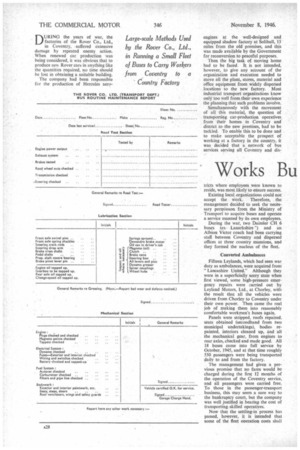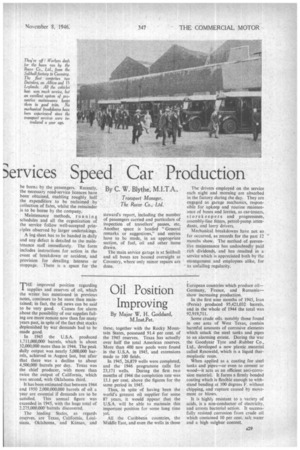• Works Bu
Page 30

Page 31

If you've noticed an error in this article please click here to report it so we can fix it.
-Services Speed Car Production
By C. W. Blythe, M.I.T.A.,
Transport Manager, The Rover Co., Ltd. DURING the years of war, the factories of the Rover Co., Ltd., in Coventry, suffered extensive damage by repeated enemy action. When renewed car production was being considered, it was obvious that to produce new Rover cars in anything like the quantities required, no time should be lost in obtaining a suitable building.
The company had been responsible for the production of Hercules aero engines at the well-designed and equipped shadow factory at Solihull, 15 miles front the old premises, and this was made available by the Government for reconversion to peaceful purposes.
Then the big task of moving home had to be faced. It is not intended, however, to give any account of the organization and execution needed to move all the plant, stores, material and office equipment from widely dispersed locations to the new factory. Most industrial transport organizations know only too well from their own experience the planning that such problems involve.
Simultaneously with the movement of all this material, the question of transporting car-production operatives from their homes in Coventry and district to the new premises, had to be tackled. To enable this to be done and to make acceptable the prospect of working at a factory in the country, it was decided that a network of bus services serving all Coventry and dis tricts where employees were known to reside, was most likely to ensure success.
Existing local organizations could not accept the work. Therefore, the management decided to seek the necessary permission from the Ministry of Transport to acquire buses and operate a service manned by its own employees.
During the war, two Daintier CH 6 buses (exLanarkshire ") and an Albion Victor coach had been carrying staff between Coventry and dispersed offices at three country mansions, and they formed the nucleus of the fleet.
Converted Ambulances Fifteen Leylands, which had seen war duty as ambulances, were acquired from "Lancashire United." Although they were in a superficially sorry state when first viewed, some high-pressure emergency repairs were carried out by Leyland Motors, Ltd., at Chorley, with the result that all the vehicles were driven from Chorley to Coventry under their own power. Then came the real job of making them into reasonably comfortable workmen's buses again.
Panels were stripped, roofs repaired. seats obtained (secondhand from two municipal undertakings), bodies repainted, interiors cleaned up, and all the mechanical gear, from engines to rear axles, checked and made good. All 18 buses came into full service by October, 1945, and at that time roughly 550 passengers were being transported daily to and from the factory.
The management had given a previous promise that no fares would be charged during the first 12 months of the operation of the Coventry service, and all passengers were carried free. To those in the passenger-transport business, this may seem a sure way to the bankruptcy court, but the company was well justified in bearing the cost of transporting skilled operatives.
Now that the settling-in process has passed, however, it is intended that some of the fleet overation costs shalt
be borne by the passengers. Recently, the necessary road-service licences have been obtained, enabling roughly half the expenditure to be reclaimed by collection of fares, whilst the remainder is to be borne by the company.
Maintenance methods, running schedules and all the organization of the service follow well-accepted principles observed by larger undertakings.
A log sheet has to be handed in daily and any defect is detailed to the maintenance staff immediately. The form includes instructions for action in the event of breakdown or accident, and provision for detailing lateness or stoppage. There is a space for the
steward's report, including the number of passengers carried and particulars of inspection of travellers' passes, etc. Another space is headed "General remarks or suggestions," and entries have to be made, in an appropriate section, of fuel, oil and other items drawn.
The main service garage is at Solihull and all buses are housed overnight at Coventry, where only minor repairs are done.
The drivers employed on the service each night and morning are absorbed in the factory during the day. They are engaged as garage mechanics, responsible for upkeep and routine maintenance of buses and lorries, as car-testers, storekeepers and progressmen, assembly-line fitters, petrol-pump attendants, and lorry drivers.
Mechanical breakdowns have not so far occurred, as records for the past 12 months show. The method of preventive maintenance has undoubtedly paid rich dividends, and has resulted in a service which is appreciated both by the management and employees alike, for its unfailing regularity.




































































